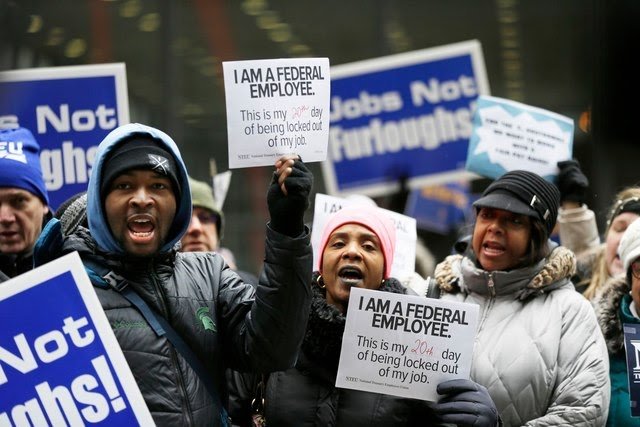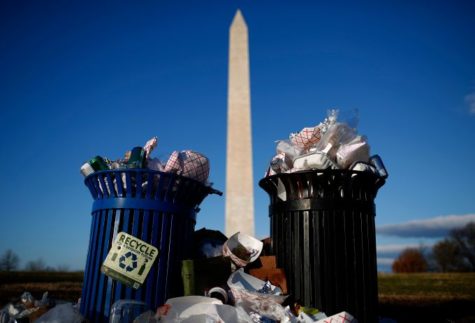
By: Lucy Terry | News Editor
January 17, 2019
The United States government is currently in the midst of the longest government shutdown in history, and there’s no end in sight. Starting midnight on December 21, 2018, this shutdown has been 27 days long and surpassed the previous 1995 record for the longest shutdown of 21 days. The shutdown began because Congress and the President were unable to come to a compromise over an appropriations bill. President Trump wants billions of dollars to build a wall on the southern U.S. border, while the House of Representatives, led by Speaker Nancy Pelosi, refuse to fund this project. Due to the shutdown, several federal departments have been closed down, hundreds of thousands of federal workers have been furloughed, and even more are working without pay.
Since Congress managed to pass bills funding around 75% of the government, making this only a partial shutdown. However, there are seven outstanding bills that have yet to be passed, which means there are still nine departments without funding; the Departments of Agriculture, State, Interior, Transportation, Homeland Security, Justice, Treasury, and Housing and Urban Development have all been impacted. The Environmental Protection Agency and Internal Revenue Service also remain shut down.
Even some agencies that have had funding restored are unable to carry out normal functions, like the Food and Drug Administration. Although the FDA is part of the Department of Health and Human Services, a large part of its funding comes from the Department of Agriculture. Without this money, they have been unable to perform routine food inspections, which leaves the roughly 31% of high-risk foods vulnerable to various viruses. The Supplemental Nutrition Assistance Program, which is the biggest domestic program fighting hunger, has stopped giving out food stamps. The Farm Services Agency, which offers crucial loans and subsidies to farmers across the country, has also been closed since December 28, 2018. Certain museums and zoos are closed, but remain caring for animals, and many research centers have stopped collecting data for important projects.
The National Park Service furloughed all of their employees except for 3,298 of them, which has led to serious sanitation and management issues in our beautiful national parks. The accumulation of trash seems minor in comparison, however, to the slowing of investigations by the National Parks Services concerning a variety of injuries and a few deaths over the past couple of weeks. Senior Jane Little is truly shocked by the visible impact the government shutdown has had on certain parks. “I never imagined the government shutdown would lead to so many trash and waste problems,” Little said. “I think that private companies or people who dedicated themselves to keeping park bathrooms clean are really admirable, but this issue is worth addressing by the actual government.” At almost every turn, the government shutdown has had lasting effects that continue to infiltrate and impact our daily life.

However, the greatest concern emerging from this shutdown is the impact on federal workers, who have either been furloughed or are working without salary. Around 380,000 federal workers are on furlough and another 420,000 are working without pay. Those furloughed workers mostly come from agencies like the National Park Service, NASA, the IRS, the Forest Service, and the nine departments previously mentioned. The majority of the 420,000 federal employees working with no pay are typically agents of the Federal Bureau of Investigation, the Bureau of Alcohol, Tobacco, Firearms and Explosives, the Drug Enforcement Administration, U.S. Customs and Border Protection. Some staff from the State Department, IRS, Homeland Security, and the Coast Guard are still working as well. Working for no salary, however, is taking a toll on individuals. Many are worried that as longer the shutdown drags on, federal employees will be less able to pay their bills and buy basic things like food and medicine. For an unfortunate few, this is already their reality. Sam Bregman, a senior at SCHS, is saddened by the disproportionate impact on workers. “I think that it’s really awful that federal workers have to work without pay during the shut down,” Bregman said. “I know people that have been personally affected, and it’s frustrating seeing such hardworking people not get paid for the work that they do.”
At this moment, the future of our government is uncertain. Although it will eventually reopen, what happens in the meantime is extremely detrimental to the perception of our government and health of our country. Each week the government is closed, people miss their salaries and millions of dollars are lost. The potential consequences this shutdown could have on our economy and well-being are chilling, and all the American public can do is watch.

Leave a Reply